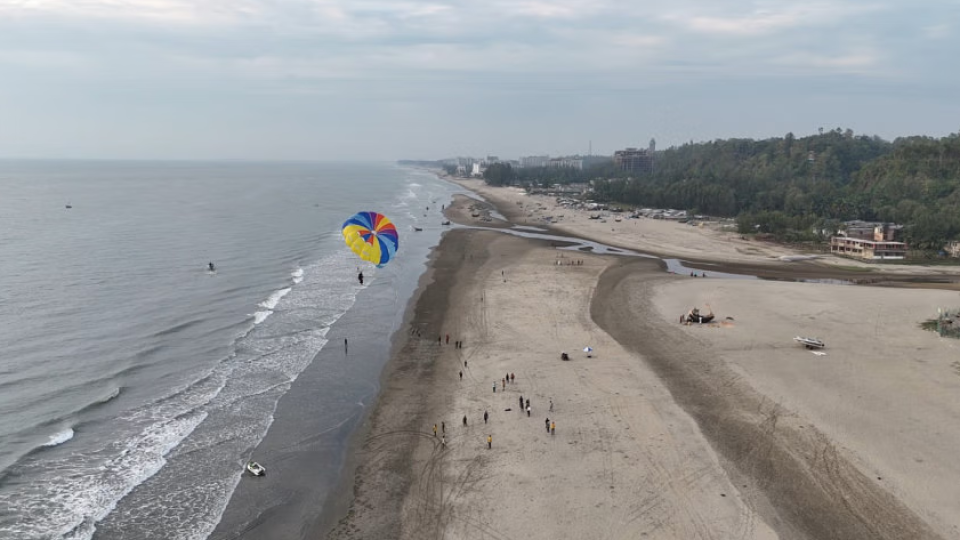December 29, 2023
DHAKA – The overall tourism industry in Bangladesh performed well throughout the outgoing calendar year despite facing adversity in the final quarter due to ongoing political unrest, according to industry people.
This is because there has been significant growth in the number of young travellers while better security at tourist spots helped build people’s confidence in being able to go on safe and enjoyable journeys, they said.
The local tourism industry usually sees peak business from September till march each year as the cooler and dryer weather during these months make them more suitable for outdoor recreation.
Cox’s Bazar and the Chittagong Hill Tracts typically draw in the largest crowds, accounting for about 70 percent of all domestic tourism in 2023 despite facing some adversities in the final quarter.
On the other hand, Sylhet and Kuakata did not get the expected number of travellers.
Royal Tulip, one of the largest five-star hotels in Cox’s Bazar, achieved an average occupancy rate of 60 percent this past year, much like it had in 2022.
“We were frightened that business may be dull this season due to political unrest ahead of the general election,” said Abdul Awal, the director of marketing and sales at Royal Tulip.
Also, ongoing inflationary pressure brought on by global crises, such as the Russia-Ukraine war, and a US dollar crunch in the country is forcing people to limit their spending in face of financial uncertainty.
“So, we are astonished to have performed so well even amid the economic turbulence,” he added.
Awal informed that their business did very poorly in November due to surging political tension that month but ultimately recovered in December, when the occupancy rate reached about 80-90 percent.
He said small hotels fared comparatively better than large ones as having less rooms available at cheaper rates means they got to enjoy around 100 percent occupancy.
Md Emran Hossain, manager of the Long Beach Hotel in Cox’s Bazar, said it was a surprise that such a high number of guests are available even amid the political unrest.
However, he assumes the opening of the Dhaka to Cox’s Bazar rail route played a part in boosting visits to the country’s prime tourist destination.
But while the hotel managed to surpass its occupancy target for December, with about 80 percent of its rooms being booked, the overall turnout is actually less compared to previous years.
“We expect the number of guests will increase after the general election,” he added.
Subrata Chakma, manager of the Khasrang Hill Resort in Sajek Valley of Rangamati, said the political tension and other factors had almost no effect on their occupancy rate in 2023.
According to him, Sajek is a major tourist spot that people visit year-round to enjoy fresh local fruits and cuisine alongside the region’s natural beauty.
Additionally, a section of people remains unaffected by the current economic turbulence.
“So, their visits helped keep the business alive,” he said while informing that there are more than 130 hotels and resorts across Sajek.
Santus Kumar Deb, chairman of the department of tourism and hospitality management at Dhaka University, said measures to provide proper security at tourist spots helped ensure an adequate turnout.
This is because people did not have to fear for their safety even amid the political unrest, he added.
And while pointing out that almost all schools and colleges in the country have shut down for winter break, Deb said the number of young tourists has increased substantially over the past decade.
“This is another reason why tourism is ongoing at full-swing despite certain challenges,” he added.
He also informed that the recent strikes and blockades are seldom seen on weekends, when most tourism activities take place.
So, people can travel freely, especially given their increased confidence thanks to the security measures provided by tourist police, which has helped keep the industry vibrant in the outgoing year.
Deb said the domestic tourism industry truly took off in 2015 but its growth was badly hampered by Covid-19 in 2020 and 2021.
Referring to his research on domestic tourism, the industry contributes around 3 percent of Bangladesh’s gross domestic product with $13.8 billion in revenue.
Also, the industry has achieved average growth of 15 percent annually, excluding the pandemic period.
Badrul Islam Chowdhury, manager of the Jaintia Hill Resort in Sylhet, said they are witnessing a dull period amid the current peak season as the number of guests is very insignificant for now.
“Last weekend, only two rooms were booked out of the 226 rooms available,” he added.
Chowdhury said he assumes tourists are not visiting Sylhet mainly due to political unrest and so, the situation will likely improve after the election.
Jaflong is one of the most popular tourist spots in the country as people come to enjoy the beauty of local waterfalls in the rainy season, he added.
Motalebar Sharif, general secretary of the Kuakata Hotel Motel Owners Association, said the weather was tourist-friendly this year but the number of travellers decreased due to political unrest.
The tourism business collapsed at the beginning of the peak season this year due to the strikes and blockades called by BNP and other political parties, he alleged.
According to him, the roughly 140 small and big hotels that have a combined capacity to house 15,000 guests in Kuakata are facing a tourist crisis as the average occupancy rate is below 50 percent.


